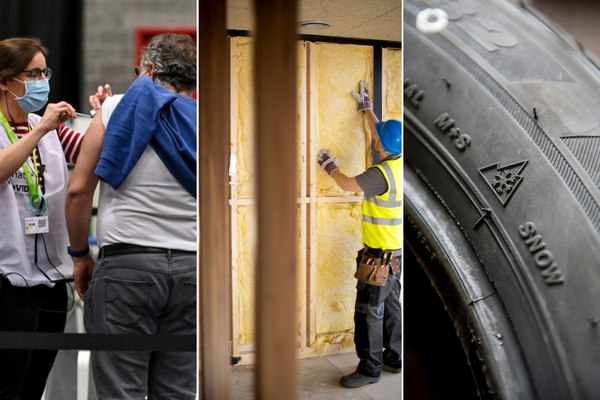From regulations on rent indexation and switching off city lights to vaccination centres changing their opening hours, here's what changes on Tuesday 1 November.
Vaccination centre opening hours
From Tuesday, vaccination centres in Flanders will reduce opening hours as the initial demand for autumn boosters has subsided.
4.5 million people in the region have now had the chance to receive their autumn booster. Those still wishing to have an additional vaccine dose can go to pharmacists and GPs.
So far, almost 3.5 million people living in Belgium (30% of the population) have already received a second booster. In Flanders, this figure is 40%.
Public lights turned off in Wallonia
From Tuesday in Wallonia, public lighting in some 164 municipalities (out of a total of 197) will be switched off between midnight and 05:00 until 31 March next year.
The measure will see heritage sites and monuments unlit; city centres will largely be excluded to guarantee the safety of people out after dark.

Street lights turned off in Brussels early in the morning. Credit: The Brussels Times
The measure will cut energy consumption in the region and protect municipal budgets saving an estimated €1.5 million. Wallonia has already started switching off the lights on its motorways between 22:00 and 05:00.
Limits on rent indexation
Wallonia will also set limits on rent indexation from Tuesday, depending on the EPB certificate (energy performance of buildings). The move will protect tenants who are struggling both with rent and energy bills.
The most energy-efficient buildings (A, B and C-rated) will still be able to raise rents in line with inflation while D- and E-rated buildings will be limited to a maximum of 75% and 50%, respectively. Buildings that have an F rating (which accounts for around 30% of people in the region) cannot be indexed.
The changes should shield up to 75% of people living in the region from rising rents. Walloon housing minister Christophe Collignon says that the measure accounts for the needs of both owners and tenants and will encourage landlords to insulate their properties and make them more energy efficient.
Testing old-timers
From Tuesday, a new framework to test old-timers (vehicles that are more than 25 years old) will come into effect, putting road safety as a priority. The existing system has been clarified with a view to better protect vintage car buyers, Flemish Minister of Mobility Lydia Peeters stated.

Credit: Belga/ Jan Nagels
As these vehicles often require modifications, they are often no longer in their original condition. A new report will now be used by inspection centres to verify that conversions are safe.
Vehicles that date back to before 1 January 1926 will be exempt from periodic checks. Such vehicles are often cultural heritage and rarely drive on public roads. Vehicles dated before 15 June 1968 also enjoy an exemption from submitting certificates if the cars were converted before 20 May 2018.
Ecopower drops fixed-price contracts
From 1 November, energy cooperative Ecopower, which supplies green electricity in Flanders, is also dropping fixed-price energy contracts.
In an e-mail to its 56,000 members, the energy supplier said that it would have to increase its prices to the current market conditions. From 1 November, cooperators will pay a tariff calculated on the basis of fixed and variable parameters. In recent months, several other energy suppliers, including Engie and Eneco, announced similar measures.
Fines for not using winter tyres on French roads
Looking beyond Belgium, people driving in the high mountain regions of France (48 French departments) without snow tyres, all-season tyres or chains will receive a fine of €135; their vehicles will also be seized.
The changes are likely to affect tourists travelling to the country in the upcoming ski season and remain in force until 31 March.

